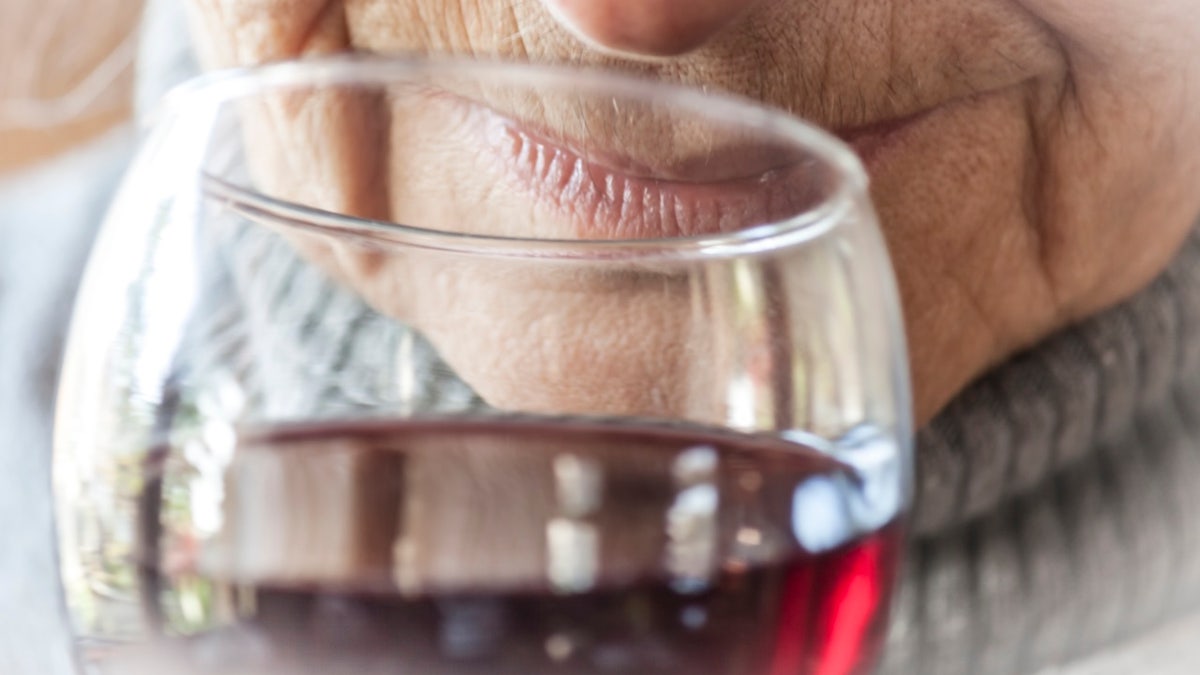The negative health impacts of alcohol have been in the spotlight since the surgeon general’s recent advisory, and now experts are warning that older drinkers might be more sensitive to those effects.
As an individual’s body changes with age, so may a person’s tolerance when it comes to drinking.
“As we age, our lean body mass and the water percentage in our body decreases,” Dr. Frederick Davis, associate chair of emergency medicine at Northwell Health on Long Island, New York, told Fox News Digital.
ALCOHOL LINKED TO CANCER RISK IN US SURGEON GENERAL’S NEW ADVISORY
“This leads to a decrease in our ability to metabolize alcohol at the same rate as when we were younger, leading to smaller amounts causing more impairment.”
Some studies have also found that older drinkers might be more susceptible to alcohol’s effect on coordination, reaction time and memory.
Experts are warning that older drinkers might be more sensitive to the effects of alcohol. (iStock)
Healthcare experts warned of the following negative effects of alcohol that can worsen as people age.
1. Heightened cancer risk
In a 2023 study published in the journal Alcohol, chronic heavy alcohol consumption was found to cause DNA damage and oxidative stress, which can lead to an increased risk of cancer, cardiovascular events and liver disease.
It is well-known that alcohol increases the risk of developing various cancers, according to Dr. Frances Lee, who treats alcohol-related liver disease at Mount Sinai Health Systems in New York City.
6 TIPS TO REDUCE ALCOHOL USE AND CANCER RISK AFTER SURGEON GENERAL’S WARNING
“Age is the main factor for developing cancer — and while we can’t stop the aging process, we can control alcohol intake, which can help reduce our overall risk of developing various cancers,” he told Fox News Digital.
Earlier this month, U.S. Surgeon General Vivek Murthy, M.D., issued an advisory warning of the link between alcohol consumption and certain cancers. Murthy noted that consuming alcohol increases the risk of liver, breast, esophageal, colorectal, esophageal, larynx, mouth and throat cancers.
2. Inflammation and insomnia
Misuse of alcohol can accelerate age-related changes, including systemic inflammation and sleep disturbances, according to the same study in the journal Alcohol.
Chronic use of alcohol in large quantities can contribute to inflammation throughout the body through a process initiated in the gut.
Additionally, the prevalence of insomnia tends to increase with age, and alcohol consumption can worsen it, according to researchers.
Several studies found that although alcohol initially has a sedative effect, it wears off after a few hours and results in disrupted sleep in the second half of the night.
Sleep deprivation is widely known to affect overall health and well-being.
3. Insufficient nutrition
Older adults need to be cautious when consuming alcohol due to nutritional concerns.
That’s according to Laura Feldman, a registered dietitian nutritionist and assistant professor of nutrition at Long Island University Post Campus in Brookville, New York.

Older adults need to be cautious when consuming alcohol due to nutritional concerns, according to a registered dietitian. (iStock)
“We need more of many vitamins and minerals as we age,” Feldman told Fox News Digital.
“When consumed on a long-term basis, alcohol can actually make it harder for the body to absorb these nutrients from foods.”
4. Worsening of existing conditions
Some older patients may have underlying chronic conditions, such as diabetes, high blood pressure, kidney disease and heart disease, several health experts told Fox News Digital.
“Not only can alcohol worsen the progression of these chronic conditions, it can also interact with medications, potentially increasing the risk of drug-induced liver injury or other undesired side effects of the medications,” Lee said.
“When consumed on a long-term basis, alcohol can make it harder for the body to absorb nutrients from foods.”
Those who have diabetes or pre-diabetes should be mindful of their alcohol intake, Feldman cautioned, as it can have a direct impact on blood sugar levels.
Alcohol may also affect bone health, which particularly affects those with osteoporosis.
Long-term alcohol consumption can interfere with bone growth and replacement of bone tissue, which can result in decreased bone density and increased risk of fractures, according to several studies.
5. Medication interactions
An estimated 87% of adults aged 65 and over and more than 90% of those over age 75 take prescription medications, according to data from the 2021-2022 National Health Interview Survey.
Combining medications with alcohol can potentially have adverse effects on health, according to Davis from Northwell Health.

The prevalence of insomnia tends to increase with age, and alcohol consumption can worsen it, according to researchers. (iStock)
“Alcohol can interact with a number of medications, making it more difficult to manage and control certain conditions and leading to more side effects,” he told Fox News Digital.
“Avoiding alcohol as we are older can reduce these risks and result in a better chance of a higher quality of life.”
6. Increased pain sensitivity
Chronic pain is one of the most common and potentially debilitating health issues facing older adults, studies have shown.
Alcohol crosses the blood brain barrier, which plays a role in its depressive and addictive effects.
Alcohol can exacerbate this issue by increasing an individual’s sensitivity to pain, some health experts shared with Fox News Digital.
“Chronic pain is a complex process of signals to our brains that is different from acute pain,” Lee said. “The complicated neural signaling of chronic pain can be altered and enhanced with alcohol intake.”
7. Mental and cognitive effects
Lee said that alcohol — a known depressant — readily crosses the blood brain barrier, which plays a role in its depressive and addictive effects.
Heavy alcohol use has also been found to increase the risk of dementia.
CLICK HERE TO SIGN UP FOR OUR HEALTH NEWSLETTER
“Alcohol intake can also worsen cognitive decline, causing issues with memory, as well as worsening some behavioral issues like depression,” Davis told Fox News Digital.
8. Increased fall risk
The risk of falls is known to increase with age. They are the leading cause of injury for adults 65 and older, according to the Centers for Disease Control and Prevention (CDC).
Falls “can lead to debilitating injury when we are older,” noted Davis, who specializes in emergency medicine.

Earlier this month, U.S. Surgeon General Vivek Murthy, MD, issued an advisory warning of the link between alcohol consumption and certain cancers. (iStock)
Alcohol impairment could affect one’s balance and coordination, leading to a higher chance of falls, the doctor cautioned.
Tips on cutting back
Those who are caring for older adults should approach conversations about alcohol consumption with a focus on collaboration rather than control, according to Jonathan Davis, CEO of Trualta, a U.S.-based company that provides education and support for caregivers.
Broaching the topic with empathy and respect will help to build trust while meeting the aging adult’s emotional and physical needs, he added.
CLICK HERE TO GET THE FOX NEWS APP
“For some older adults, enjoying an alcoholic beverage may provide a sense of normalcy and autonomy,” Davis told Fox News Digital.
Seeking a healthcare provider’s guidance can help ensure that the person understands the potential risks and interactions, he noted.

If an individual is struggling with alcohol, experts recommend speaking to a healthcare provider who can recommend support systems and medications if necessary. (iStock)
“Together, caregivers and older adults can develop a plan that balances safety with emotional well-being.”
Davis also recommended exploring alternatives to alcoholic beverages, such as mocktails, alcohol-free drinks or specialty teas that can provide similar enjoyment without the risks of alcohol.
For more Health articles, visit www.foxnews.com/health
Lee also suggested engaging in activities that do not typically involve alcohol.
If an individual is struggling with alcohol, experts recommend speaking to a healthcare provider who can recommend support systems and medications if necessary.